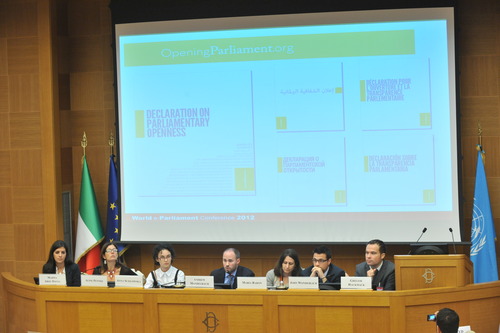
Greetings from Helsinki. I wanted to briefly report on the very successful launch of the Declaration on Parliamentary Openness that took place in Rome on Saturday, a video of which is available here. I invite other participants to chime in as well.
The event took place in the Italian Chamber of Deputies on the final day of the World e-Parliament Conference. Aside from the PMO contingent, most participants were MPs or parliamentary ICT staff, and I think around 100 parliaments were represented. The Declaration panel was the second to last of the entire event. Because it was followed by a celebration of the International Day of Democracy, featuring a number of speakers and presidents of parliaments and other high level officials, it was extremely well attended.
Consensus seems to be that the panel went off very well. Although we only had an hour for seven participants (Dan sent the list of individuals, but the organizations were: Sunlight (US), LALT Network (Latin America), NDI (US), Association 61 (Poland), Nahwa al-Muwatiniya (Lebanon), OpenPolis (Italy), ParliamentWatch (Germany)) to speak, we were able to describe the Declaration and its utility, as well as some of the ways that PMOs are effective in engaging parliaments and using parliamentary information. Questions/comments following the presentations were asked by MPs from Japan, Namibia and Indonesia - all were very positive and focused on how PMOs can help structure constructive dialogue.
Two other things that stood out:
- There was much discussion about open data and the use of open source software developed by Africa i-Parliaments (Bungeni) and the European Parliament (at4am legislative markup software, which will be open source soon). Around 20 parliaments are using, or considering to use, the Akoma Ntoso legislative document standard. However, until the PMO panel, there was little attention paid to how open data can be used by citizens. I think the PMO panel provided an important context for parliamentary openness that was very refreshing for the MPs and staff by helping them understand why it is so important.
- The PMO panel had a richness and sense of purpose about which a few members of the audience remarked positively. In part, I think this is because the panel was more youthful than most other panels. I also think that your colleagues displayed a passion about their work that contrasted with many of the other presentations, which tended to be more technical.
All in all, I think PMOs came across as being very professional and dynamic organizations that belong at the table with parliaments. I, for one, came away feeling very fortunate to be a part of this community. The Global Centre for ICT in Parliament, the IPU and the UN also deserve tremendous credit for putting the Declaration on the agenda at such a critical juncture of the conference. It was the first time PMOs had been on the agenda at a conference of this nature.
Results: A number of seeds were planted at the Rome conference and it will take some time for them to flourish. However, the IPU is interested in having PMOs present the Declaration at the upcoming Assembly taking place in Quebec City in October. There were also conversations about the possibility of opening up a dialogue on the Declaration between parliaments and PMOs in Latin America, and about the potential utility to PMOs of adopting open source tools being developed for parliaments. Part of this latter conversation came about because, apart from helping PMOs (and new PMOs) manage legislative documents, PMO advocacy and support for parliamentary adoption of these tools is seen as having great potential with respect to enhancing parliamentary openness and transparency around the world.